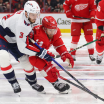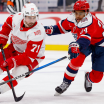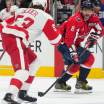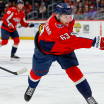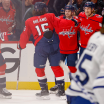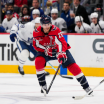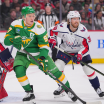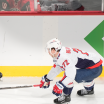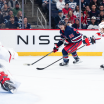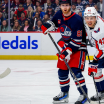In winning the Stanley Cup last year, the Caps avoided one of the bleakest days on the hockey calendar, the exit interview/breakdown day that comes a day or two after a team has been eliminated from the Stanley Cup playoffs. The Capitals still conducted such a day in 2018, but they did so on June 13, the day after a massive and jubilant Stanley Cup parade in downtown D.C.
The Sting of the Early Exit
After a year off from the sting of falling short, the Caps aim to use this spring's playoff disappointment as motivation for another Cup run in 2020
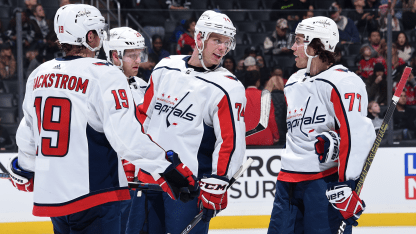
By
Mike Vogel
WashingtonCaps.com
This past Friday, the Caps endured their earliest breakdown day in five years. Roughly 36 hours after their season suddenly ended with a double overtime loss to the Carolina Hurricanes in Game 7 of the first-round Stanley Cup playoff series between the two teams, the Caps were at MedStar Capitals Iceplex for one final time, packing up their gear, undergoing postseason medical exams and trying to make some sense of their first-round ouster.
"Unless you win," says right wing Tom Wilson, "you get this feeling every year at one point or another. It never gets any easier. It sucks, and we were lucky enough not to have to go through it last year. We had an expectation and a belief in ourselves that we had a chance to do it again. You go from full flight every day to it being over, and you've got some time to reflect. That feeling sets in, and it's not a good feeling."
"It's a tough feeling," says center Nicklas Backstrom. "But at least you have a thought in your head. You know how small the margins are for winning or losing, whether it's first round second round or third round. The margins are really small. But we've been through it and we've won before and that gives you confidence for the next year. We have to make sure we learn from this and we learn how important everything is, and how well prepared you've got to be for the playoffs. That's just fact."
Nicklas Backstrom | Exit Interview
Conducting the autopsy doesn't always lead to a clear-cut cause of death diagnosis in the NHL, but teams routinely go through the exercise anyway, hoping to avoid making similar mistakes in the years ahead. Few things in the game are more agonizing and frustrating that toiling hard in training camp and over an 82-game, six-month regular season grind, only to fall short come springtime. It's not unusual for a defending Cup champion to find itself knocked out in the first round of the playoffs the following year, but it's not easy, either.
"It's just nice that we didn't have to do it last year," says defenseman John Carlson. "I don't think it makes it any easier when you lose. You share the same feelings as any other year."
"It's a hard one," says general manager Brian MacLellan. "I still think we're working through it. Our middle six forwards didn't play as good as their middle six forwards, basically. We didn't have the total team effort that we had last year - the commitment, the desperation - and it's hard to put a finger on why that happened.
"We had guys that had career years this year, that played well throughout the season, that improved, and didn't play as well in the playoffs. And I think when you don't have everybody going with that desperation, it translates into losing a series that you probably should have won."
Washington went through the 2018-19 regular season as the Cup champs, and managed an almost identical regular season to its championship campaign of the year before. The Caps came just one point short of matching their total from 2017-18, and they once again won the Metropolitan Division title and earned home ice for the first two rounds of the playoffs.
But once the playoffs started, things started going a little sideways. Even in winning the first two games of their best-of-seven set with Carolina, the Caps didn't play as well as they were capable of playing. Washington came in like a lion, scoring the first three goals of Game 1. But it went out like a lamb, giving up the last three goals in Game 7, and looking slow and overmatched in the overtime.
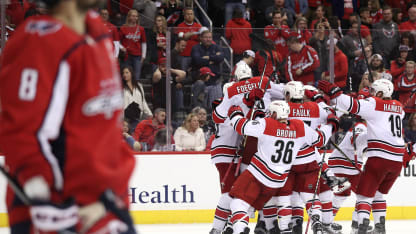
When the Caps won the Cup in 2018, they outscored the opposition by at least seven goals in each of the three periods. This year's model scored 10 of its 20 playoff goals in the first, and found tough going thereafter. The Caps outscored Carolina 10-4 in the first, but Washington was outscored 17-10 the rest of the way.
While Carolina got scoring from up and down its lineup, the Caps had players who were big contributors during the regular season that went quiet once the playoffs started. Washington's offensive output was far too top heavy in the 2019 playoffs. Last spring, the Caps' top line delivered 32 of the team's 86 playoff goals (37.2 percent). This season, it delivered more than half (12 of 20, 60 percent) of the team's offense.
"It's a team game," says Caps coach Todd Reirden, "and you need to have everybody at their top level. I think that we weren't able to have everybody execute and have their best games at the right times. Ultimately, it comes down to some things that went our way and some things that didn't go our way - in terms of bounces - which are going to happen. But then ultimately, it comes to getting contributions throughout your lineup and through your depth scoring, and we didn't have that."
Health is another key factor. Last season, the Caps lost Andre Burakovsky for 11 games and Backstrom for four, but were otherwise healthy throughout their two-month run with the Cup. In 2019, Washington suffered a big loss when defenseman Michal Kempny went down late in the regular season and right wing T.J. Oshie was lost for the rest of the way late in Game 4.
"I hate making excuses, but the two injuries that we suffered really disrupted the balance of our lineup," says defenseman Brooks Orpik. "Those are two guys that you are not replacing what they can do. You can put other guys in those slots, but with all due respect to the guys that played, you're not getting to the level that those guys performed at.
Brooks Orpik | Exit Interview
"I thought that really disrupted the balance of our team. It's something that you'll reflect on, and think that maybe if you get by this round, maybe those catch up to you even more the next round. While you're in the first round, you don't allow yourself to think that way. But it was disappointing to lose those guys. You need some luck along the way, and we had a lot of that in terms of health last year."
"We definitely missed them," echoes Carlson. "They're both irreplaceable guys that fit into the locker room and what we try to do on the ice to a tee. When they jump over the boards and everyone is watching them, they're perfect guys to get you jacked up and fired up. They're not replaceable, but I still think we could have had a lot better fate than we did without them."
Washington got better as each series wore on in 2018, and the opposing team's top players became less of a factor as each series went in. This spring, it was the opposite. The Caps struggled late in the series and late in virtually every game, and Carolina's best players came to the fore in Games 6 and 7, and they were a factor in the outcome.
Last spring, the Caps tied an NHL record by winning 10 road games in the playoffs. They were 10-3 on the road in the playoffs last spring, and they were 0-3 with just three goals scored in three road games this spring.
"I think maybe Games 6 and 7 there when we had the lead," says Backstrom, "we should have been able to just manage it a little bit better. They're a good team, especially at home. But you have a 3-1 lead with a couple of minutes left in the second [of Game 7], you just have to go to the third with a 3-1 lead, I think. That's just the bottom line. In previous years, that's an area where were able to shut teams down and make sure they got nothing. I think that's where it slipped away."
That's a common theme that sticks in the Caps' collective craw and likely will for the duration of the summer. They led the series twice, and they had a pair of two-goal leads in Game 7 on home ice, and they still couldn't close it out.
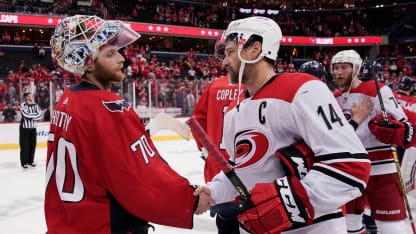
"It's unacceptable to have two two-goal leads in a Game 7 on home ice and not be able to close it out," says Orpik. "I think you look at that immediately. We were in position to win the series. I might feel differently a month from now when you remove the emotion from it, but I didn't think we really played that well to be honest with you in the series. In Game 5, we played well but if you really look at the series as a whole, they were the better team over the course of the series. I don't think they were necessarily the better team, but for those seven games looking back on it, they were probably the more deserving team to move on. You get to an overtime in Game 7, it can go either way. But if you want to use the word 'deserving,' they were probably more deserving than we were."
That's another common theme, that the defending champs didn't play as well as Carolina played in the series, and that the Canes were the more deserving team.
"There were probably several moments that if we had played better or executed better or had taken advantage of an opportunity here or there," says Caps defenseman Matt Niskanen, "it probably wouldn't have gotten to the point where it did where anything could happen.
"We were up 2-0 in the series, we were up 3-2 in the series. In Game 7, we had a 2-0 lead and a 3-1 lead. We probably should have won, but we didn't deserve to. Give them credit, they kept coming. They won four of the last five games. They deserved to win, and we didn't play well enough to win. We didn't deserve it."
Aside from their 6-0 win in Game 5, the Caps couldn't put the Canes away late in games. Carolina rebounded from multi-goal deficits to make Game 1 close and it forced overtime in Game 2. The Canes had the puck more, and the Caps never seemed to get to their game. Washington was able to put teams away and close the door in 2018; it disposed of each opponent in its first opportunity to do so. The killer instinct was lacking this time around, in games and in the series.
"We saw that in order to win, you need to control the ups and downs," says Wilson. "You need to do everything it takes, and everything needs to fall accordingly. We had opportunities in this series to show a killer instinct and take care of business, and we just didn't. We kept playing and playing, and next thing you know you're in a double overtime of a Game 7, and the puck goes in. We had leads in the series and we had leads in both elimination games. At this time of year, you just need to be close those out if you want to win, and we didn't seem to be able to do it."
Tom Wilson | Exit Interview
As they sift through the rubble of a season ended too soon, and with the knowledge that this exact group of players will never take the ice together again as NHL teammates, the Caps are left to rue about the opportunity that got away. Washington used the bitter disappointment of playoff failures in 2016 and 2017 as motivation to finally reach the promised land in 2018, and it hopes the sting of falling short this spring can help spur it to another long run in 2020.
"Definitely," says goaltender Braden Holtby. "Even more so now. You go through a championship run, and the whole next season it seems like everything is positive and nothing can go wrong. I think this is a good reminder that it's not an easy thing to become a champion. And this is one where it hurts because we know what it's like to go through and win, and to have that feeling of joy and accomplishment. To not do that, it's going to sting a little bit more and motivate us even more come the future."
"I think coming off a year where you win it," says Orpik, "you're hoping that you're going to do it again. So when it doesn't happen, you're a little devastated. But at the same time, I think it hits home and puts into perspective how hard it was to do what we did last year. And that's even more magnified this year when you look at the teams that were bounced out in the first round. I think it gives you a better appreciation of what we accomplished last year. Obviously it's still a tough one to swallow this year. By being up 2-0 in the series and then having two two-goal leads at home [in Game 7], I wouldn't say it's stunning at all, but I still think it's a tough one to swallow.
"I think it gives you a pretty clear image of the level of sacrifice and commitment that you need both on and off the ice at this time of the year and leading up to it. Maybe that wasn't at the same level as last year when we won. Hopefully guys can identify that and see the difference there, without going into too much detail. But it's tough. It really gives you a strong appreciation for what Pittsburgh did a couple of years ago in trying to repeat."
At last year's Cup championship parade on June 12, Oshie fired up the enormous crowd by starting the "back-to-back" chant. While the bid for consecutive crowns obviously fell short, the nucleus of the team is intact and the Caps believe they will have another chance to get back to the mountaintop next spring. But rather than shelving the pain and the anguish that exit day delivers almost annually, Oshie believes it should serve as a prime motivator.
"I think the only correct way to use it is for motivation for next year," he says. "Even after you win and then you come back and obviously we fell short this year, you are still very proud to call yourself a Stanley Cup champion. But you're no longer the top dog, and that top dog feeling is a nice feeling to have, knowing that at the moment you hold the title. To not have that feeling, to go home early and to do exit meetings and having the media asking you what went wrong and why it didn't work, those are good times for reflection on how you could have been better.
"When you win, the last feeling you have is that moment when the clock runs out and you throw your gloves up. And when you lose, typically you think of that last mistake you made or that last shot that didn't quite go in, and that's what sits with you for the whole summer. So it's never easy and it's never fun being on this side of it. But I think it's almost better motivation than when you win."



